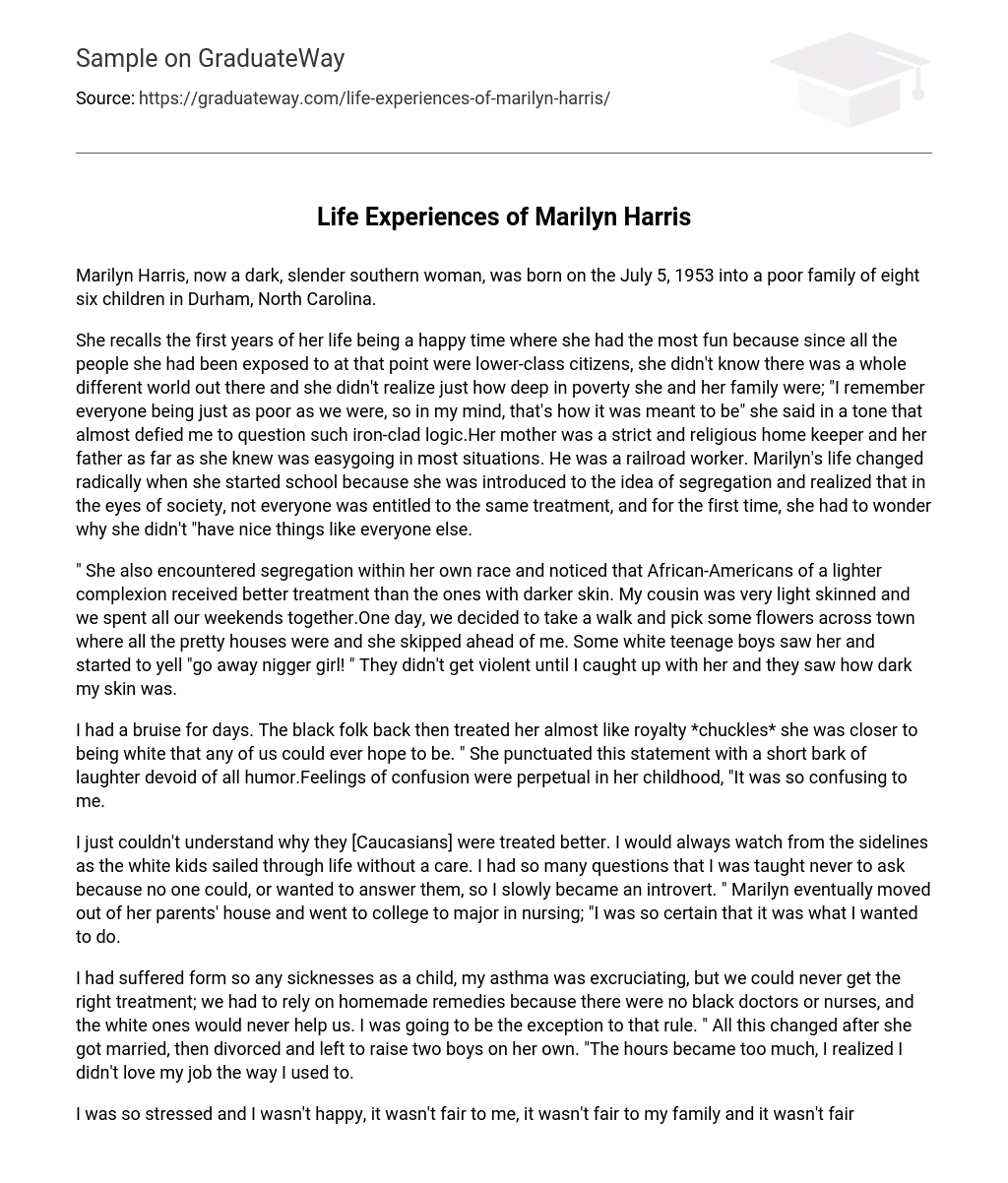Marilyn Harris, now a dark, slender southern woman, was born on the July 5, 1953 into a poor family of eight six children in Durham, North Carolina.
She recalls the first years of her life being a happy time where she had the most fun because since all the people she had been exposed to at that point were lower-class citizens, she didn’t know there was a whole different world out there and she didn’t realize just how deep in poverty she and her family were; “I remember everyone being just as poor as we were, so in my mind, that’s how it was meant to be” she said in a tone that almost defied me to question such iron-clad logic.Her mother was a strict and religious home keeper and her father as far as she knew was easygoing in most situations. He was a railroad worker. Marilyn’s life changed radically when she started school because she was introduced to the idea of segregation and realized that in the eyes of society, not everyone was entitled to the same treatment, and for the first time, she had to wonder why she didn’t “have nice things like everyone else.
” She also encountered segregation within her own race and noticed that African-Americans of a lighter complexion received better treatment than the ones with darker skin. My cousin was very light skinned and we spent all our weekends together.One day, we decided to take a walk and pick some flowers across town where all the pretty houses were and she skipped ahead of me. Some white teenage boys saw her and started to yell “go away nigger girl! ” They didn’t get violent until I caught up with her and they saw how dark my skin was.
I had a bruise for days. The black folk back then treated her almost like royalty *chuckles* she was closer to being white that any of us could ever hope to be. ” She punctuated this statement with a short bark of laughter devoid of all humor.Feelings of confusion were perpetual in her childhood, “It was so confusing to me.
I just couldn’t understand why they [Caucasians] were treated better. I would always watch from the sidelines as the white kids sailed through life without a care. I had so many questions that I was taught never to ask because no one could, or wanted to answer them, so I slowly became an introvert. ” Marilyn eventually moved out of her parents’ house and went to college to major in nursing; “I was so certain that it was what I wanted to do.
I had suffered form so any sicknesses as a child, my asthma was excruciating, but we could never get the right treatment; we had to rely on homemade remedies because there were no black doctors or nurses, and the white ones would never help us. I was going to be the exception to that rule. ” All this changed after she got married, then divorced and left to raise two boys on her own. “The hours became too much, I realized I didn’t love my job the way I used to.
I was so stressed and I wasn’t happy, it wasn’t fair to me, it wasn’t fair to my family and it wasn’t fair to my patients.So I quit my job. Besides, we had to move the ghetto in North Carolina was not where I wanted to raise my kids; they were starting to act like all the other boys. I was scared.
” She got a job as a correctional officer at the jail in Hagerstown, Maryland. “I still hate my job, but it puts food on the table; I have two college age boys, and I need to get them educated. My first days on the job were difficult, I was lonely and so I attempted to bond with some of the inmates – big mistake.I would find out that many of them lied to me to get sympathy.
It really hurt my feelings because I thought we were friends. I learned to detach myself from them pretty quickly after that. I often find myself wanting to get unnecessarily aggressive with a lot of the inmates; something I learned when I was very young…. you see I could never show anger to the white folk who made me feel like dirt, so I would instead take it out on everyone else when I felt threatened.
And threatened is the primary mood of the lockup. “





